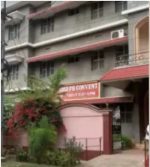Duburi: I live with two other nuns in Maria Bhawan, a convent of the Missionary Sisters Servants of the Holy Spirit in Dubur, a village in Jajpur district, Odisha, eastern India.
Our community, located about 110 km west of Bhubaneswar, the state capital, is one of the frontier missions of the archdiocese of Cuttack-Bhubaneswar.
Odisha has the largest number of tribes among all Indian states — as many as 62 distinct groups. They form 24 percent of Odisha’s 43.73 million people.
We are surrounded by villagers and mostly Ho tribal people. The Indian government has listed them among the most backward communities in the country.
They are also known as the Lanka Kol or the Bihar Ho tribes. Ho literately means ‘Man’ and the tribal people are found in Singbhum district of Bihar, and Mayurbhanj district of Odisha, parts of West Bengal, Bangladesh and Nepal. Their language is also known as Ho.
These people mainly depend on cultivation for survival. However, in the recent years, industrialization and climatic changes have adversely affected their life. Many young people now as coolies mines and plant as they are not skilled workers.
They need to be empowered socially, educationally and economically. Trusting in the providence of God, we commit to journey with them.
Educational level in the area is 10 to 20 percentage among the men and less than 12 percent among women. Hence education is a top priority for all of us here.
Another priority is healthcare. One staff along with the medical sister is always available for patients round the clock. They come from near and far off villages. There are occasions very serious patients come to our dispensary. People come even after the treatment in Sriram Chandra Bhanj Medical College and Hospital, Cuttack. Poison cases are a regular feature. Daily about 10 to 15 patients come to dispensary.
Since the arrival of the companies around the town, and with their periphery development programs such as provision of free medicines to various villages have reduced our patients in the dispensary.
Christianity reached in the place some 25 years ago. There is a long way to strengthen people faith. Our Catholics are scattered in various villages. Together with our Divine Word missionaries, catechists, we work in pastoral activities.
We are involved in socio-pastoral, health care, and girls’ hostel apostolate. The main focus of our mission is the development of ‘Ho’ tribe. Due to their seclusion, they remain educationally, economically and socially backward.
With their struggles and concerns, our life is a message and our mission is to journey together with them and our goal is to be rooted in Trinitarian spirituality.
We come together for prayers, both in the morning and in the evening. Liturgy is well prepared by the Sisters. Creative way of preparation and celebration of liturgy make it meaningful. Liturgy contains local and national festivals, along with various events of the day. We try to integrate our mission with it.
We use occasionally the scriptures of other religions. On different occasions or festive days, we adopt rich symbols, meaningful rituals and various forms and methods of meditation and group prayers. There is a strong sense of community feeling among sisters.
Sharing of Word of God in the light of our life experiences becomes very meaning full. Arranged monthly recollections and community evaluations make our community life more authentic and meaningful. Spirit of prayer unites the community daily.
Common meals and sharing from each one’s apostolate along with recreations and sharing play a significant role in uniting our community. Annual community picnic and family Feast adds to community bonding stronger
Our evangelical counsels strengthen our community living as we express our love for one another in receiving as well as in loving the other. It helps us to be compassionate to the other, caring and in showing concern for the other.
We pray for one another and this enables us to become forgiving and caring. Reading the Word of God for the day and its reflection is a great help to go deeper into the gospel and make efforts to live it in concrete action and contemplation. We become at home with what happens in a day—becoming aware of the inner and outer happenings.
Poverty makes us conscientious use of things. We have a simple life style in accordance with the people around.
Each one is fully committed to her apostolate. We remind each other in time of need.
Some of our key activities include socioeconomic development. Since 1995 our congregation is involved in socio-economic development of the HOs. We have formed some 37 Self Help Groups and monitor their activities with a help of one Ho animator. This was to improve their economic condition and foster leadership qualities among women.
We organized training on mushroom cultivation in three places which included four villages each. Received subsidized bank loans for 12 SHGs for different activities. About 30 to 40 people were treated from our locality from their sickness through financial help and 10 new SHG groups were formed within this year.









